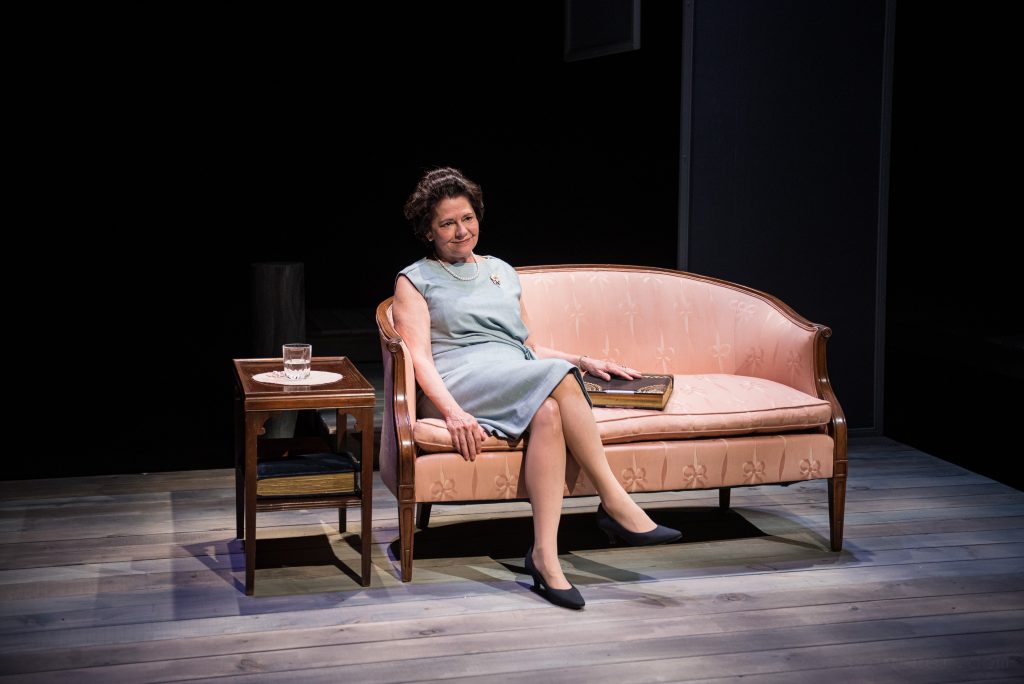Rose Kennedy As She Never Quite Was
Renaissance one-woman show is a wonderful production of a play that will surprise you.
Stop by Renaissance Theaterworks’ new home, the theater at 225 S. Water St. in Walker’s Point through June 5, if you don’t believe a one-actor play – often a company’s desperation bailout in this era of COVID-19 — can actually provide genuine artistry, a hypnotic portrayal, emotional engagement and historical context to boot, even when it was booked as a last-minute substitute for a larger production that got postponed because of the circumstances of a troubled year.
That is the background of the current offering – Rose: An Intimate Evening With Rose Fitzgerald Kennedy, highly regarded in Chicago runs, but enjoying its first performance here to close the Renaissance season.
In fact, many are familiar tales of 20th century American history about the matriarch mother of nine who saw two of her children die in plane crashes, two assassinated (JFK and Bobby) and her favored youngest Ted embroiled in the Chappaquiddick scandal and contemplating quitting the Senate.
It is during the Chappaquiddick tumult that Rose takes place in a mythical vision of her Hyannis Port home where a settee rests amid boardwalks for Rose to stroll, as transparent scrim panels (under the control of Smooch, a Chicago technician) display old photos of the family at convenient moments plus images of fire and the sea.
Leamer is having a bit of fun with the “intimate” in the subtitle, furthering the illusion that Rose was this revealing in conversations to unseen guests. Her charm at campaign tea rallies is well recorded. Her devotion to a wealthy opinionated husband engaged in constant affairs and clearly tolerant of his sons doing the same – well, that is harder to explain, and she seldom acknowledged it though she does at length here.
Also revealed in indirect candor is her preference for the sons over the daughters, the flinty steel Boston Irish roots against the wealthy, superior-minded Protestants of her social circle and the belief in family and Catholicism first regardless of how her husband ran roughshod over her fidelity and her wishes. If she ruled this family, it was a case of conveniently overlooking things.
The actress keeps us convinced we are overhearing the real Rose while the revelations are not always in her moral favor, though the conviction of her explanation is always engaging. That we believe in this Rose even as she reveals more of herself than anyone could, that she can justify herself through such acts as letting her husband use lobotomy to turn a slow but lovely daughter into a vegetable – well, if you don’t think that takes great acting, see for yourself.
This feat is aided mightily by an imported Chicago director, Elizabeth Margolius, who understands that with so talented a performer, watching her back is as revealing as watching her eyes in a three-sided theater with seven projection panels.
The technical elements are first rate, as is most of the pace and the decisions about when to wander and when to sit still. Even for those who grew up with the Kennedy legend and thought there was nothing new to learn, the acting is revealing. The play only becomes too much of “and then I suffered” near the end, but it holds the eye and engages the mind in the way that only good theater can.
Dominique Paul Noth served for decades as film and drama critic, later senior editor for features at the Milwaukee Journal. You’ll find his blog here and here.
If you think stories like this are important, become a member of Urban Milwaukee and help support real, independent journalism. Plus you get some cool added benefits.
Review
-
Eating Burmese in Bay View
 Dec 13th, 2025 by Cari Taylor-Carlson
Dec 13th, 2025 by Cari Taylor-Carlson
-
Casablanca Is a Milwaukee Success
 Nov 30th, 2025 by Cari Taylor-Carlson
Nov 30th, 2025 by Cari Taylor-Carlson
-
Oh, Those Witty 18th Century Brits
 Nov 24th, 2025 by Dominique Paul Noth
Nov 24th, 2025 by Dominique Paul Noth
Theater
-
Oh, Those Witty 18th Century Brits
 Nov 24th, 2025 by Dominique Paul Noth
Nov 24th, 2025 by Dominique Paul Noth
-
Skylight’s Holiday Show Is Lots of Fun
 Nov 16th, 2025 by Dominique Paul Noth
Nov 16th, 2025 by Dominique Paul Noth
-
Rep’s ‘Come From Away’ Is a Triumph
 Nov 10th, 2025 by Dominique Paul Noth
Nov 10th, 2025 by Dominique Paul Noth



















